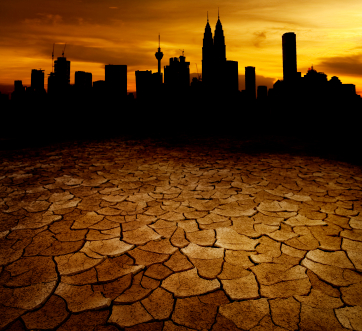 The realization that our water is in fact a finite resource has become all the more clear over the last year where parts of the country have experienced the worst droughts in a century. The changes in global weather patterns and a rapidly growing population have also substantially affected the water supply.
The realization that our water is in fact a finite resource has become all the more clear over the last year where parts of the country have experienced the worst droughts in a century. The changes in global weather patterns and a rapidly growing population have also substantially affected the water supply.
In 2010, an article was written that examined the risk of water shortages across the country. The writers of the article looked at an October, 2010 report on water risk by environmental research and sustainability group, Ceres. They also considered a comprehensive July, 2010 report from the National Resources Defense Council which mapped areas at high risk of water shortage conflict. The analysis allowed officials to choose ten cities which are likely to face severe shortages in the relatively near-term future. The cities are:
10. Orlando, Florida
9. Atlanta, Georgia
8. Tuscon, Arizona
7. Las Vegas, Nevada
6. Fort Worth, Texas
5. San Francisco Bay Area, California
4. San Antonio, Texas
3. Phoenix, Arizona
2. Houston, Texas
1. Los Angeles, California
However, according to Natural News, these cities should not be the only ones concerned about future water shortages. According to U.S. government estimates, at least 36 states are expected to face water shortages within the next five years.
The Ripple Effect
In many parts of the country where severe droughts are present, the dry, hot ground is causing major water mains to break and essentially draining the city’s water. In the very near future, cities and towns could place more stringent water restrictions on its inhabitants, but how would these restrictions affect the city as a whole? Recently, in Houston, TX three firefighters were injured in a 4 alarm fire. The article indicates that the fire was difficult to put out partly due to issues with the water supply. This begs the question of how can a city not warn its inhabitants of a water shortage? If there is a water shortage in many areas of the states, are we all vulnerable to the water be turned off like in this North Texas town?
If we experience water shortages in much of the nation, then cities will have to look for alternate water sources. Water is already a scarce commodity, so there will be competition both locally and statewide for remaining water sources which could make life in these cities nearly unbearable for residents. With emotions running high, a ripple effect could sweep the nation and possibly fuel more aggressive behavior among those living in major cities.
Self Reliance is Key
With the exponential population growth, cities simply cannot meet the demand for water, and as a result, water sources are overwhelmed and being depleted. Those counting on local water supplies to always be available run the risk of one day waking up to find their water has run out. Understanding ways to be less dependent on the local water supply will ease this burden and, in the process, make you more self reliant. Learning alternative ways to harvest water is a proactive approach to dealing with this pressing issue. These low cost suggestions are a great place to begin this path towards self reliance:
- Collapsible water containers
- 5-gallon buckets
- Rain harvesting containers or barrels
- Rainwater downspouts routed to water tanks by pvc pipes
When looking for a homestead property or land:
- Try to find a property that either has its own water source, well water, or is capable of supplying water via a well.
- Before you purchase any land, do some research and find where local streams, ponds and rivers are located near by to ensure your family has a back up water supply during times of shortages.
- Those of you living in regions that lie directly below mountain ranges will have clean water that will be readily available for consumption before pollution is introduced.
Having knowledge before hand on how to appropriately treat water and store it will ensure that your family has the most basic, and most important survival item ready in case a water shortage ensues.
As a collective whole, we must actively begin taking the steps to physically detach ourselves from depending on the system. Knowledge and understanding on how to effectively treat and store water will ensure that your family has the most important preparedness item ready for use.

Maybe Los Angeles should save some of the rainwater they let run into the ocean every time it rains. I know common sense is too much to ask for from government.
Water IS NOT a finite resource. Yes certain areas of the world can, will experience droughts, and immediate access to fresh water maybe disrupted, but water does not just disappear, it is recycled and re-delivered back to the earth. but I guess the sheeple will buy into the story of PEAK WATER now.
We just had a major power outage that included parts of Arizona, all of San Diego county (in California) and parts of Mexico – where I live we are on well water. What was surprising was that even though we have a well – it is still run by electricity so when the power went down, no one had water!!! So another issue besides having an alternative water source is also making sure we have the ability to access it using alternative energy, i.e, a generator, solar or wind power when the grid goes down again. This was a good lesson for us and fortunately it was just a one day event this time!